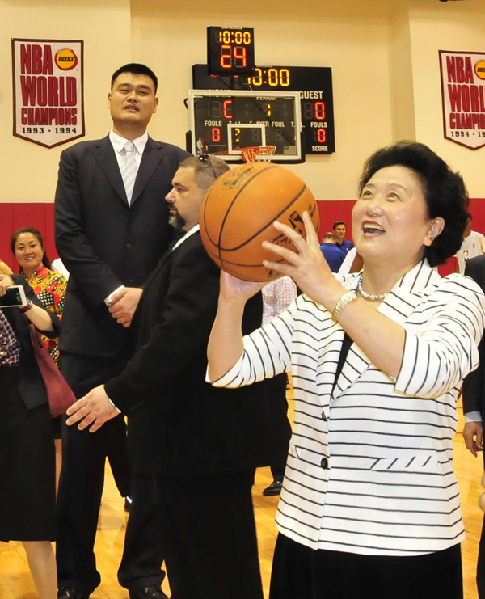

 |
|
Vice-Premier Liu Yandong shoots for the hoop at NBA basketball team Houston Rockets' home court Toyota Center watched by former Rockets star Yao Ming. A group of Chinese student athletes from Tsinghua High School are working on a basketball training program with the Rockets. Liu will attend the 7th China-US Strategic and Economic Dialogue in Washington on Tuesday. [Photo by Zhang Yongxing / Xinhua] |
South China Sea, climate change and Xi’s visit expected to feature in Washington discussions
Beijing and Washington will open annual talks on Tuesday that are set to feature issues including the South China Sea and climate change.
The Strategic and Economic Dialogue is also expected to pave the way for President Xi Jinping’s visit to the United States in September.
US Secretary of State John Kerry and Treasury Secretary Jack Lew were scheduled to host State Councilor Yang Jiechi and Vice-Premier Wang Yang for a private dinner on Monday ahead of the two-day talks at the State Department.
The world’s two largest economies are at odds over US accusations of cyberespionage by China, which Beijing has denied.
Washington has also voiced concerns over China’s land reclamation project on some of its islands in the South China Sea, but Beijing has said the islands are its sovereign territory and the project will benefit the region.
US President Barack Obama is seeking support from China before world leaders gather in Paris in December for a global climate summit.
Danny Russel, the top US diplomat to East Asia, has vowed not to “paper over” the differences in the talks. But “both powers have incentives to calm the waters” ahead of Xi’s state visit, The Associated Press reported on Monday.
In an opinion piece on The Wall Street Journal website on Sunday, Wang wrote that he believes the talks will be of particular significance in laying the groundwork for Xi’s visit.
He also disagreed with the notion that the Strategic and Economic Dialogue produces more accusations than results, citing the examples of talks on the Bilateral Investment Treaty and climate change.
The Strategic and Economic Dialogue was critical in kick-starting talks on the investment treaty that had been stalled since 1982, but were jump-started in 2013 during the fifth round of the talks.
According to Wang, over the past decade China has also been committed to market-based currency reform, and the yuan has appreciated by 35 percent against the US dollar.
Jin Canrong, deputy dean of the School of International Studies at Renmin University of China, said that in this round of talks China will continue to push forward the investment treaty and discussion on the yuan as part of the International Monetary Fund’s international basket of reference currencies.
Washington has insisted the yuan has been manipulated, but the IMF said in May that it was “no longer undervalued”.
Jin said one major task is to prevent the Sino-US relationship from slipping and to increase positive factors, given the two nations’ differences on a series of security issues.
Adam Posen, president of the Peterson Institute for International Economics, a private and nonprofit think tank in Washington DC that focuses on international economics, said differences will not necessarily doom the dialogue, adding that the talks will still be “professional”.
David Dollar, an expert at the Brookings Institution, predicted that the chill in ties arising from security issues will not spill over into the economic discussions.
“If anything, tension on the security side makes the economic talks more important,” Dollar said.
Vice-Premier Liu Yandong and Kerry will begin the sixth China-US High-Level Consultation on People-to-People Exchange on Tuesday.
On Sunday, Liu called for more “basketball diplomacy” to strengthen mutual understanding between people from China and the US during a visit to NBA basketball team the Houston Rockets.
AFP contributed to this story.
Contact the writers at chenweihua@chinadaily.com.cn
Related Stories